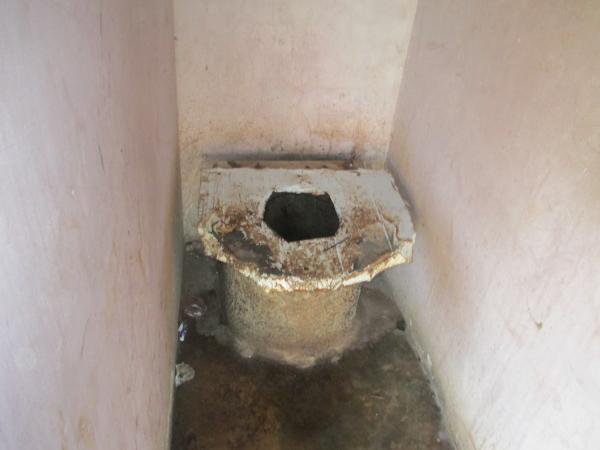

A girl’s toilet at Nyangilizwe Senior Secondary School. Photo by Mary-Anne Gontsana.
26 April 2013
Equal Education has organised a two-day “solidarity visit” of schools in the Eastern Cape. GroundUp journalist Mary-Anne Gontsana is reporting what she sees. Here is her second report.
Clean water and sanitation are human rights, but nowhere are these rights visible in Mthatha’s Nyangilizwe Senior Secondary School.
The high school was established in 1972. It caters for grades 10 to 12. There are 23 teachers teaching 730 learners. The school has eight dilapidated, filthy pit toilets, four for males and four for females. Teachers and students use the same toilets. The main photograph shows just how awful these are.
Nyangilizwe’s principal is Vuyani Zembe. He says water and sanitation are among the biggest problems they face in their school. The school also has a serious overcrowding problem and a shortage of text books. “We try to do our very best under these circumstances but there are handicaps. We are supposed to have 25 teachers but two have left. Our school hall is used as accommodation for the equivalent of three classrooms. We have 121 matriculants and two classes, which means each class has about 60 learners. Last year 110 learners sat down to write the matric examinations, but only 10 learners passed with exemption or, as we say, a university pass,” explained Zembe.
Zembe said that drugs and crime were a huge problem. “Our learners are easily caught up in illegal outside activities. There was a time when two Grade 12 learners attended an evening class drunk. Ever since I started here in 2005, there has hardly been a weekend without a break-in.” He also said that nine learners dropped out last year because of teenage pregnancies.
No textbooks have been received from the education department for grade 11 mathematics, accounting and maths Literacy. “At first we were responsible for getting our own textbooks from a bookshop, but the education department told us they would take over. Since then we have had textbook shortages. This did not happen when we procured our own books because we had an understanding and a relationship with the bookshop,” explained Zembe.
As we were led to see the toilets we walked along a path with three temporary structures used as classrooms on the left. On the right were unfinished, empty and muddy rooms, with no windows or doors. Then came the eight toilets, in an open field which was filled with long grass. The orange painted structure had five openings which were separate, two of them with a thick black plastic cover hung like a curtain for a door. Inside was a pit toilet with hard plastic on top, used as a toilet seat.
IsiXhosa educator and head of department, Pateka Nkonki, said the sanitation problem was the worst. She demonstrated how before they used the toilets, they poured Jeyes Fluid to get rid of the terrible smell. “We clean the toilets ourselves because no one is employed to do so.”
The school had two green water tanks which were filled up due to the rain. Had it not rained, there would be no water available for learners to drink or wash their hands. There had been a situation once where there was no water at all. The learners were sent home and then water was bought from town and the tanks filled up the next day.
About 20 kilometres outside Mthatha is another desperate school. Ntapane Senior Secondary School has massive overcrowding. Lulama Genge is a teacher and her classroom has 102 learners. But this is not the worst. A grade 9 class has 138 learners. “We are really struggling. There is just no space but we do the best we can. There was a time when I told the principal that I refuse to take anymore learners in my class. The school was then called by the education department. So there is nothing we can do. We cannot turn learners away and parents really like this school because it is a good one,” said Genge.
Despite these struggles eight learners had an opportunity to go to Switzerland in 2011 to show off their gymnastic talents.